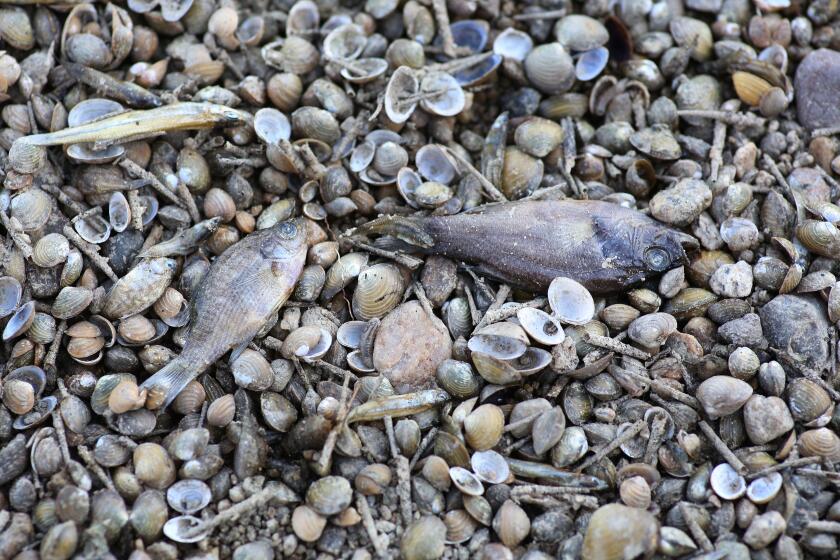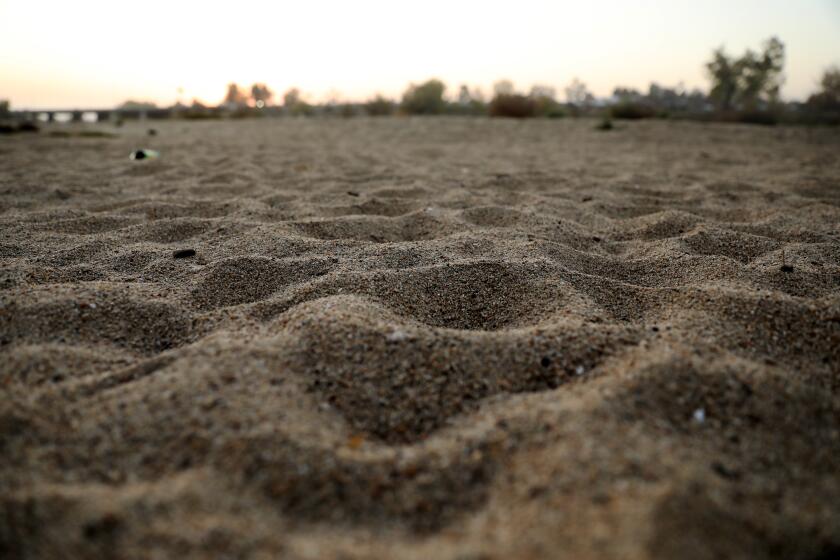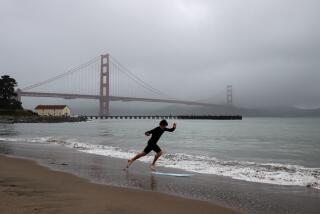
California officials have joined a legal effort to restore water to the Kern River after an abrupt shutoff of water dried up the river and killed thousands of fish in Bakersfield.
The decision by state officials and Atty. Gen. Rob Bonta to intervene in the court case gives new impetus to environmental groups as they try to compel the city of Bakersfield and agricultural water districts to bring back a flowing river.
Bonta announced Monday that he and the California Department of Fish and Wildlife filed a brief supporting the environmental groups in the case before the state’s 5th District Court of Appeal.
“California’s waterways and ecosystems are the lifeblood of our state’s rich and diverse wildlife and natural habitats,” Bonta said. “Yet, in Bakersfield, the sudden loss of Kern River flows due to the city officials’ decisions to divert all water away from the river, is leaving behind a dry wasteland where fish are dying in droves.”
A sudden shutoff of water supplies has dried up the Kern River in Bakersfield, leaving thousands of dead fish on the parched riverbed.
The river suddenly dried up along several miles of its channel in Bakersfield starting in late August. Those who first noticed the abrupt loss of water included Rae McNeish, an associate professor at Cal State Bakersfield who was conducting biological surveys with her students.
They gathered data on the devastation as the flowing river dwindled to a dry riverbed, leaving masses of dead fish scattered on the sand and mud. By mid-September, they had counted more than 3,000 dead fish.
The collapse of the river came as a shock in Bakersfield, where residents had grown accustomed to seeing water flowing past parks and beneath bridges after two wet winters. It followed an appeals court ruling that cleared the way for city officials and water managers to reduce flows upstream, keeping some water behind a dam and sending other supplies to farms.

Bonta said with the filing of the friend-of-the-court brief, “we urge the Court to allow enough water to flow in the Kern River, as required by law, to preserve ecosystems and ensure sustainability and viability of our fish populations.”
In the state’s brief, Bonta focused on the importance of a certain state environmental statute: Fish and Game Code Section 5937. It requires that all dam owners and operators release sufficient water to keep fish below the dams in “good condition.”
Six environmental groups have also cited this statute in their case. The groups, led by Bring Back the Kern and Water Audit California, sued Bakersfield in 2022, arguing that allowing water diversions to dry up the river violates California’s public trust doctrine, the principle that certain natural resources must be preserved for the public.
The city controls several weirs where water is diverted. Some of the water is used in Bakersfield, but much of it is used by agricultural water districts to supply farms that produce almonds, pistachios, grapes, oranges and other crops.
Last year, a judge granted the environmental groups a preliminary injunction requiring the city to ensure sufficient water to keep the river flowing and provide for fish. But agricultural water districts appealed that ruling. And earlier this year, an appeals court froze the judge’s order, effectively allowing for the river to be drained and dried up while the case is pending in Kern County Superior Court.
The attorney general’s office said in its announcement that in late August, the city of Bakersfield “once again diverted all of the flows from the Kern River below the Calloway Weir to deliver to agricultural customers, leaving thousands of fish to die.”
The Kern River has long been a dry riverbed in downtown Bakersfield. A group of residents is pushing to bring back a flowing river.
The attorney general’s brief argues that city officials must follow the law and release sufficient water to keep the river flowing and fish in “good condition.”
The dewatering of the river and the mass fish die-off sparked an outpouring of concern in the community. City officials have said they would like to make more water available for the Kern River but that the recent court decision does not currently allow for that.
A spokesperson for the city declined to comment about the attorney general’s decision to intervene in the case.
The environmental groups’ lawsuit is directed at the city but also lists agricultural irrigation districts that receive water as parties, including the Kern Delta Water Storage District, North Kern Water Storage District and Rosedale-Rio Bravo Water Storage District.
Officials with the California Department of Fish and Wildlife said last month that they were investigating whether the drying of the river constituted a violation of state law.
As the agency signed on to intervene in the court case, Department of Fish and Wildlife Director Charlton “Chuck” Bonham said failing to provide enough water for fish “not only damages ecosystems and fish populations but also violates California law.”
Bonham said the department is standing with the attorney general “to help protect these irreplaceable fish populations for generations to come.”
State officials have previously taken the same position, including a case years ago involving the Napa River, said William McKinnon, a lawyer for the group Water Audit California.
“I hope that we get a good, unequivocal statement from the appellate court that puts to rest all of these arguments forever, because they’re getting old,” McKinnon said.
He said he also hopes the state’s involvement in the case leads to cooperative discussions “to reconcile human and environmental needs.”
“We just want the environmental flows to be there,” McKinnon said. “We still have no water. We still have dead fish.”









